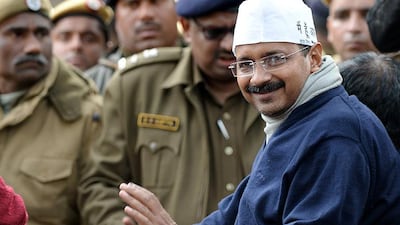NEW DELHI // Barely a month after sweeping the Delhi assembly election, the Aam Aadmi Party (AAP) has axed two of its most prominent members from a key party committee, signalling deep divisions within its leadership.
On Wednesday evening, Yogendra Yadav, a social scientist, and Prashant Bhushan, a lawyer, were voted off the political affairs committee which steers the party’s political strategy.
They had been accused of conspiring to oust Arvind Kejriwal, the party’s leader and the chief minister of Delhi.
Mr Kejriwal himself did not attend the vote, which ended a six-hour meeting of the AAP national executive body – the party’s top decision-making committee.
A source within the party told The National on Thursday that Mr Kejriwal had threatened to quit as party leader unless Mr Yadav and Mr Bhushan were voted out.
Mr Yadav and Mr Bhushan lost the vote 11-8, with three members abstaining. They still remain as members of the AAP.
Kumar Vishwas, a member of the political affairs committee who had abstained from the vote, said that Mr Yadav and Mr Bhushan “will be … given new responsibilities” which have yet to be specified.
Mr Bhushan and Mr Kejriwal have worked together since the early 2000s, when they both part of a larger activist campaign that lobbied the Indian government to pass a Right to Information Act. The act was successfully passed in 2005.
In 2011, Mr Bhushan joined Mr Kejriwal and other activists in a series of anti-corruption protests in Delhi. Mr Yadav formally joined them a year later, after they moved from activism to politics with the launch of the AAP.
In the wake of the AAP’s win in the Delhi assembly election in February, media reports and insider accounts have described a divergence of ideas and strategies within the party.
A day before Wednesday’s vote, Mr Bhushan said the AAP was in danger of becoming a one-man party, in which only Mr Kejriwal “calls the shots”.
“What is important is that the party’s decision-making should be democratic and broad-based,” he told NDTV on Tuesday.
There were also signs of discord in the lead up to the Delhi election campaign.
Mr Bhushan had expressed his concern several times about the way in which the party selected its candidates. Some of them were not vetted sufficiently, or had records that ran contrary to the AAP’s claim to being a squeaky-clean, uncorrupt party, he said then.
Mr Bhushan has called the allegation that he and Mr Yadav were conspiring to unseat Mr Kejriwal “absolutely baseless and absurd”.
“Unfortunately, Arvind has not called me. There has been a breakdown of communication … But I am open and willing to talk,” he said.
In June last year, Mr Yadav had written a letter to the political affairs committee warning that “love and affection for a leader often turns into a personality cult that can damage an organisation and the leader himself”.
Mr Bhushan and Mr Yadav last week called for an ethics committee to be formed within the AAP.
The “one-person-centric campaign, which was run during [the] Delhi elections, is making our party look more and more like other conventional parties”, they said in a letter to the national executive.
Mr Yadav was cautious on Thursday when he wrote on Twitter: “Flood of messages of solidarity and outrage from party volunteers. I appeal to all that we retain our faith in the idea of @AamAadmiParty.”
Mr Kejriwal also tweeted: “I am deeply hurt and pained by what is going on in the party … I refused to be drawn in this ugly battle. Will concentrate only on Delhi’s governance.”
At the AAP meeting on Wednesday, Mr Yadav and Mr Bhushan had offered to quit the political affairs committee if it could be newly reconstituted through a vote, according to Mayank Gandhi, a member of the party’s national executive. They also offered not to field any candidates in this internal vote, thus voluntarily withholding their influence from the national executive.
Both these offers were rejected, Mr Gandhi said in his personal blog.
The executive body voted only on a resolution to reject Mr Yadav and Mr Bhushan. It was a resolution proposed by two of Mr Kejriwal’s closest lieutenants.
Mr Gandhi said he abstained from the vote.
“I was taken aback by the resolution of removing them publicly, especially as they themselves were willing to leave. Also, this decision to sack them was against the overwhelming sentiments of volunteers from all over the world,” he wrote.
ssubramanian@thenational.ae

